Rogerene “Kali” Arce
Leading the only County Department of Agriculture
Alfredo G. Evangelista | Assistant Editor
“Agriculture is the basis for food, feed and clothing,” says Rogerene “Kali” Arce, the first Director of Maui County’s Department of Agriculture. “Agriculture food production allows community access to locally grown foods to the community. Agriculture also provides many jobs not only at the farm but through aggregation facilities, food hubs, manufacturing centers, restaurants, grocery stores, value added production, slaughterhouses, feed companies, cooperatives, plant genetics and nurseries,” explains Arce.
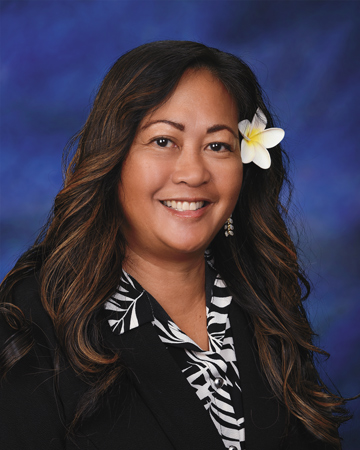
Photo courtesy Rogerene Arce
Two and a half years ago, the voters of Maui County adopted a charter amendment creating a Department of Agriculture. It was a historical moment as no other County in the State of Hawai‘i has its own Department of Agriculture; the State Department of Agriculture is often viewed as emphasizing regulations rather than assisting farmers.
The Charter amendment was a simple yet far reaching question: “Shall the Charter be amended, effective July 1, 2022, to establish a Department of Agriculture to develop a sustainable regional agricultural system for Maui County?”
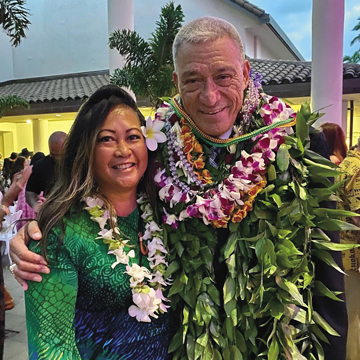
Photo courtesy Rogerene Arce
In remarks after the 2020 historical vote, East Maui Councilmember Shane Sinenci explained: “I introduced the charter amendment in response to farmers requesting more assistance, both financially and technically, and residents’ concerns about our islands’ economic resiliency and food security.”
Until 2016, Maui clung to its historic agricultural-based economy, with the largest remaining sugar plantation in Hawai‘i, H.C.&S. in Pu‘unēnē, employing hundreds of Maui residents. In December 2016, however, the last tournahauler brought in the final harvest of sugar cane and Maui ceased to be King of Sugar. Tourism became the undisputed economic driver on Maui as well as the rest of the State.
The H.C.&S. lands remained fallow until December 2018 when Mahi Pono announced it purchased about 41,000 acres of H.C.&S. agricultural land owned by Alexander & Baldwin.
To start the complicated process of creating a new Department of Agriculture, an agriculture advisory group was created in 2021. Members included Brendan Balthazar, David and Carol Brown, Kyle Caires, Ryan Duffy, Kimo Falconer, Geoff Haines, Vince Mina, Annette Niles, Buddy Nobriga, Nelson Okamura, Robert “Bobby” Pahia, Joshua “Shyloh” Stafford-Jones, James Tavares, Shan Tsutsui, Grant Nakama, and Warren Watanabe. It was a cross section of the local agricultural community representing the Maui County Farm Bureau, Mahi Pono, cattle owners, coffee growers, flower growers, hemp growers, organic and conventional planters, landscape professionals, ranchers and retail, among others. The advisory group began the arduous task of listening to the community and recommending guidelines for the creation of the Department.
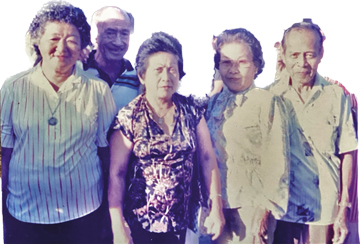
Photo courtesy Rogerene Arce
William Jacintho, Mina, Pahia, Kilia Purdy-Avelino and Watanabe became members of a Selection Committee, charged with reviewing applicants for the position of Department Director. In the end, out of eighteen applicants, the committee unanimously recommended Arce as Director and then-Mayor Michael Victorino appointed Arce. In September 2022, the Council confirmed Arce’s selection as Director and Arce was sworn in on October 4. After Richard T. Bissen, Jr. defeated Victorino for the Mayorship, Bissen retained Arce as Director.
When Arce was announced as the Director-designate, most news outlets emphasized she was a Hawaiian homesteader. But Arce is proud of her Filipino ancestry. The daughter of Rogelio Pio Montero and the late Junice Ah Kwai Peters traces her roots to Ilocos Sur and Cebu.
Arce’s paternal grandfather, Pio Pader Montero, was born in Santa Maria, Ilocos Sur, and immigrated to Oahu in 1931 on the President Hoover. He worked as a finger lift operator and was married to Alejandra Caballes and later Purificacion Dalit. Arce says her paternal great-grandparents and great-great-grandparents’ surnames are Montero whose spouses had surnames of Pader and Cabacungan, all from Narvacan, Ilocos Sur.
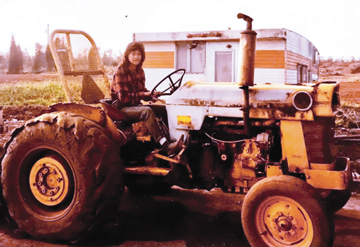
Photo courtesy Rogerene Arce
Arce’s maternal grandmother, Alejandra Caballes, was born in North Kohala on Hawai‘i island and she lived in Kualapu‘u, Molokai and worked on the pineapple plantation for about twenty-two years with her third husband, Jose S. Della. Arce’s maternal great-grandfather Gervasio Caballes immigrated to Hawai‘i in 1923 from Sibonga, Cebu and was married to Segunda Philomena Savilla, also from Cebu. The surnames of Arce’s maternal great-great-grandparents are Caballes and Mirabueno of Cebu.
“My younger sister and I spent many summers with my grandparents Jose and Alejandra Della on Molokai from infancy until elementary age,” remembers Arce. “I recall going with grandma to clean the Catholic church and help her in the garden. When the summer was over, I returned to O‘ahu to my maternal grandparents, Henry H. Peters, Sr. and Bernice Yim, who also helped raise me.”
Arce notes her sister, Jersula Manaba, who for over twenty-five years has managed Molokai’s Home Pumehana Hale Mahaolu, is a past Mrs. Filipino Valentine, sponsored by the Molokai Filipino Community Council.
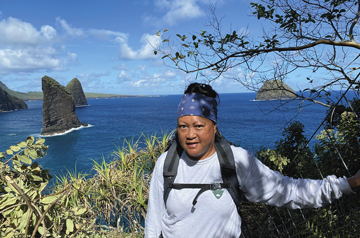
It is easy to understand why Arce was unanimously recommended, appointed, confirmed, retained and re-confirmed by two Mayors and two different County Councils. After graduating from Kamehameha School at the Kapālama campus, Arce received a Bachelor of Science in Agriculture from the University of Hawai‘i Hilo College of Agriculture. Arce received a Graduate Certificate in Sustainable Agriculture from Washington State, leading to her receiving a Master of Science in Agriculture from Washington State University College of Agriculture, Human and Natural Resource Sciences.
Arce’s work experience includes Kalaupapa National Historical Park, Hawai‘i County Economic Opportunity Council, Monsanto, Molokai Land Trust and the University of Hawai‘i Maui College, where she was a part-time lecturer for nineteen years. “I used to hike to work three miles down on Sunday and up on Thursday on the Kalaupapa trail,” she says of her time with the Kalaupapa National Historical Park in the Natural Resources Management Department, where she also served a few months as the Acting Chief of the Department. At Monsanto, Arce “supervised crews in the planting and all the other manufacturing processes (harvesting, shelling, husking) and operated equipment (forklift, husked machine, shelling machine, moisture meter and shake out machine).” Arce later became supervisor in the “Insect Pest Management Department which required me to walk through corn and soybean fields to scout for insects, weeds and disease pests then, assign appropriate pesticides. I was also responsible for record keeping and attending any in-house audits and those conducted by the Hawai‘i Department of Agriculture.” In 2015, Arce was tasked to develop the newly established Conservation Department. “I got the Molokai Monsanto farm to be the first third party conservation certified farm in Hawai‘i with Wildlife Habitat Council, a third-party agency specializing with corporate businesses,” observes Arce. “I also got them recertified at the gold level. One of the projects I designed was a one-acre native plant pollinator habitat. With my five-man crew, we planted, installed walkways and signage which groups from all over the island, state, continental U.S. and international countries visited and learned from me about the conservation work being done to increase diversity on the farm and improve the ecosystem.” Another project which brought honors to Arce was one in which she and her crew planted eleven miles of native Hawaiian trees and shrubs as an agroforestry windbreak system to protect over two thousand acres of crops. “For these two projects, I won the company the Wildlife Habitat Council’s Forest Award for superior management and installation of forest in 2017,” beams Arce.
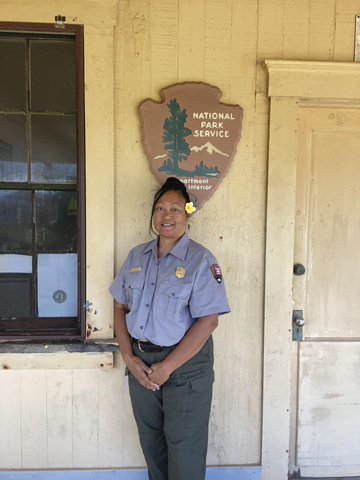
Photo courtesy Rogerene Arce
Arce has also owned several businesses such as Potted Beauties, Nativescapes, and TropiKali LLC.
The official Mission of the Department of Agriculture is stated as “The County of Maui’s Department of Agriculture will support the development and continued management of a sustainable regional agricultural system for Maui County, to promote resident and ecosystem health and well-being and create a thriving circular agro-economic system that can be a model for the rest of the world.”
Arce explains the Department’s Mission is simple: to “provide advocacy and not create additional regulatory barriers on all matters related to agriculture.” As Director, Arce has the responsibilities to:
• “Develop a sustainable regional agricultural system for Maui County;
• Develop opportunities in the agricultural sector to increase economic resiliency;
• Ensure locally grown agricultural products to improve health and food security;
• Promote natural-resource regeneration and protection;
• Develop and implement programs to diversify and expand sustainable forms of agriculture; and
• Annual reporting to Mayor and County Council of overall performance in meeting agricultural objectives.”
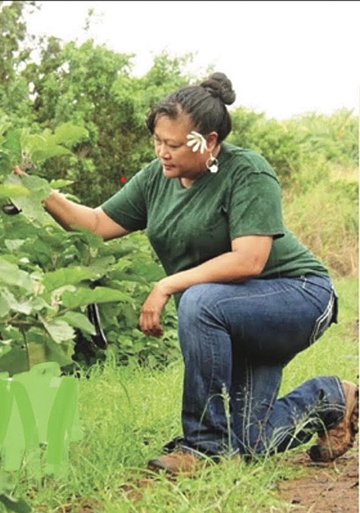
Photo courtesy Rogerene Arce
This February, the Department established its Grant Division. Arce encourages “agriculture producers, including ranchers, value added producers and any agricultural related organization to access grant opportunities from the Grant Division.”
Arce is currently hard at work to establish two new Divisions within the Department: Agricultural Field Operations and Food Security. The difficulty, however, is “writing job descriptions which do not exist in the State or any County jurisdictions,” claims Arce.
Arce also mentions she is busy with “transitioning the management of the Kula Agriculture Park from the Office of Economic Development.” In addition, she is “currently working on developing a five-year Strategic Plan.” To top it off, Arce is “searching for federal funding opportunities to build capacity of department and to create grant funding opportunities for the community.” The recently adopted State Budget includes $10million in funding, to be matched by the County of Maui, for a County Upcountry Agricultural Park and related infrastructure.
But Arce wants to do more and promises “the Department will bridge the gap where state and federal government agencies do not provide services to agricultural producers to develop relevant programs that address needs.” Arce reveals after an “initial needs assessment of Lanai, Molokai and some of Maui, it was clear that workforce development, infrastructure and market development were the top priorities that resonated across the County thus far.”
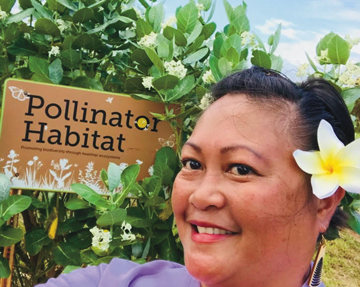
Photo courtesy Rogerene Arce
Arce understands the need to partner with recent graduates and she is “looking into developing internship opportunities within the Department for new college graduates and students in Agriculture, Natural Resources and Sustainable Agriculture programs.” She is studying “the situation of the slaughterhouses” and will “identify improvements and if there is a need for more to accommodate the possibility of a venison market and the recovering of the beef cattle industry.”
And yes, there’s more!
Arce endeavors to “work with partner agencies on addressing the farm management, market development and providing education of special topics based on the interest of small farmers.” Arce definitely has the best interests of Maui’s agricultural community in her heart and soul. Arce’s extensive background in agriculture and conservation with a diverse range of jobs starting in the field, progressing to training others then outreach education and applied field research then fieldwork, ag production and operations and later moving into conservation work will serve her well in her new position. Her roots in agriculture are deep and above all, she is ready and willing to listen. “I am interested in hearing from our farming communities.”
Arce jokes she doesn’t have to hike to go to work anymore. But she does pay out of pocket to fly weekly from Molokai to work on Maui where her office is located at 2154 Kaohu Street in Wailuku. She also needs to travel between three of the four islands constituting the County of Maui. Regardless, Arce will continue to thrive.
“My career is in a traditionally male dominated industry that has been fulfilling,” expounds Arce. “I hope this paints the picture of what perseverance and determination can do for one that applies their will. I think it is important to be passionate about the area of work you are involved in and sometimes sacrifices are necessary to achieve your goal.”
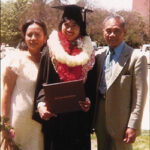 Alfredo Evangelista is the son of the late Elias Acang Evangelista, who arrived on Maui in 1946 and worked for H.C.&S. for thirty-seven years, and Catalina Gonzales Evangelista, who worked at Maui Pineapple Company, retiring in1995. During the summers of 1974, 1975 and 1976, Evangelista worked at Maui Pineapple Company in the label line of the warehouse division. The late Agrifina Cabebe, who worked in the personnel department of Maui Pine, gave Evangelista his assignment.
Alfredo Evangelista is the son of the late Elias Acang Evangelista, who arrived on Maui in 1946 and worked for H.C.&S. for thirty-seven years, and Catalina Gonzales Evangelista, who worked at Maui Pineapple Company, retiring in1995. During the summers of 1974, 1975 and 1976, Evangelista worked at Maui Pineapple Company in the label line of the warehouse division. The late Agrifina Cabebe, who worked in the personnel department of Maui Pine, gave Evangelista his assignment.
